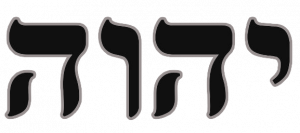Perhaps one of the lesser known names of God is YHVH Tzid’qenu
(pronounced Tzeed-qeh-nu).
יהוה צידקנו
t means Yahweh (or Yehovah some prefer) our Righteousness. In most translations, it will be the LORD our Righteousness. When we see the word LORD, fully capitalised in our English translations, the original Hebrew will have been 
(YHVH in our English lettering). The reason for this needs to be explained at another time.
What does the actual Hebrew word, Tzid’qenu mean?
It means ‘our righteousness’ and stems from the word ‘tzedeq’, which means upright and just. 
YHVH’s judgements are always right and He is consistent in His love, His mercy, and His judgements. Simply put, our God is without sin and there is no unrighteousness in Him.
Let’s look at Genesis 3:21-24.
Yahweh is confronted with Adam and Eve, who have disobeyed His instructions not to eat of a certain tree. His righteousness demanded action, and there had to be consequences for their disobedience, yet His mercy ensured that they were not destroyed…holiness, judgement and mercy in perfect balance.
It is possible to read this portion of scripture and feel that Yahweh is being harsh in His dealings with His creation. The English translation reads “drove out” (the Hebrew word used is ‘garash’).
Yahweh’s response wasn’t angry, disillusioned or vindictive. He cast them out of the garden for their own safety so that they would not live forever in their state of disobedience – sin – in which state they could no longer be with Him.
We meet this balance of holiness, mercy and judgement (later to be known as ‘redemption’) even in the first chapters of the Bible.
Adam and Eve were the first to need this ‘redemption’ in the face of a holy and righteous God.
This thread of redemption and the quest for righteousness weaves its way through both the Old and New Testaments. Cover to cover we see that the ultimate price for disobedience was death. Laws given to the Israelites were an attempt by Yahweh to reconcile them to Himself and to bridge the chasm between his righteousness and their lack of righteousness.
The history of Yahweh’s relationship with the Israelites is one of wooing and mercy, yet, time after time, His tolerance and righteousness were tested to the limit.
In Jeremiah 23:5-6, Yahweh prophetically sets out His plan to bridge the chasm between his righteousness and man’s inability to live a holy, righteous life (the first time ‘YHVH Tzid’qenu’ is used).
“The days are coming” declares YHVH, when I will raise up for David a Righteous Branch. A king who will reign wisely. In His days Judah will be saved and Israel will live in safety. This is the name by which He will be called: Yahweh our Righteousness”
(YHVH Tzid’qenu)
This was, in fact, the predicted coming of Yeshua. So, how then does the coming of Yeshua help us earn our righteousness?
Well, we can’t! Before Yeshua came, man’s righteousness depended on his own efforts.
Man looked inside himself and strove to find peace, forgiveness, kindness, and ways to walk blamelessly under the law. However, even the most holy of men found this impossible.
Isaiah 64:6
“All our righteousness acts are like filthy rags.”
Romans 3:10
“There is none righteous, not even one.”
If there was no-one completely righteous but YHVH, then it makes sense that He was the only one who could offer it as a gift. He did. He sent his Son, Yeshua, to take our place on the cross and, once and for all, become righteousness to those who believe. The offering of Yeshua became the amazing solution.
2 Corinthians 5:21
“God made him who had no sin to be sin for us, so that in him we might become the righteousness of God.”
We come to Yeshua realising that our rightful place was, indeed, on the cross. When we accept His death as propitiation for our sin, it allows our loving Father to see us as completely righteous. Here we stand in the awesome place of those who are righteous before a loving God. He has, in fact, become YHVH our Righteousness.
We have no claims based on our own acts, nor our performance, nor, indeed, anything we have done outside Yeshua. Are we tip-toeing around Yahweh hoping that we are good enough? Or are we feeling that we need to impress him and earn points? Are we hunting inside ourselves to chase down peace, forgiveness, love?
We have the privilege of having righteousness imputed to us by Yeshua, so we can go before Yahewh but, by faith, through our desire and choice, we know that Holy Spirit is helping us to ‘outwork’ that righteousness daily.
The answer is not inside ourselves but in our relationship with Yeshua. He is our provider of not only that imputed righteousness (which is not of works) but, also our model and support every day, as we “work out our salvation with fear and trembling.” (……………………………………..)
2 Peter 1:3
“His divine power has given us everything we need for a Godly life…”
We just need to choose and ask for it to be outworked in us. May we always live being thankful and appreciating the cost of YHVH Tzid’qenu.
